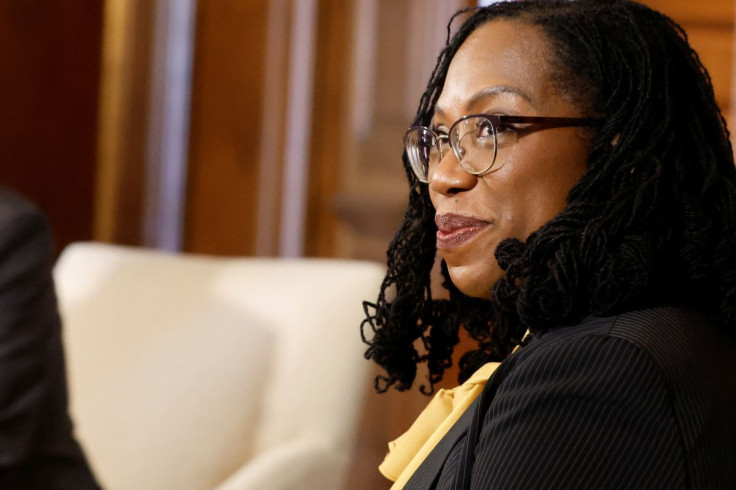Ketanji Brown Jackson Brings Varied Legal Resume To U.S. Supreme Court

If confirmed as its first Black woman justice, Ketanji Brown Jackson would add not only racial and gender diversity to the U.S. Supreme Court but would also bring a varied legal background including a stint representing low-income criminal defendants.
Jackson, 51, served early in her career as a Supreme Court clerk for Justice Stephen Breyer, whose retirement announced in January created a vacancy on the nation's top judicial body that President Joe Biden picked her to fill. Biden, a Democrat, last year appointed Jackson to an influential Washington-based appellate court after she served eight years as a federal district judge.
Jackson's four-day Senate Judiciary Committee confirmation hearing starts on Monday. A simple majority vote in needed in the Senate to confirm Jackson to the lifetime post. She has won three prior Senate confirmation votes for other jobs.
Biden has sought to bring more women and minorities and a broader range of backgrounds to the federal judiciary. He pledged during the 2020 presidential campaign to name a Black woman to the Supreme Court, which has had only two Black justices, both men: Clarence Thomas, appointed in 1991 and still serving, and Thurgood Marshall, who retired in 1991 and died in 1993.
During her April 2021 confirmation hearing for her current judgeship, Jackson said her background - personal and professional - would "bring value" to the bench, but said race does not shape the way she does her job.
"I don't think that race plays a role in the kind of judge that I have been and that I would be," Jackson said in response to a question posed by Republican Senator John Cornyn.
"I'm doing a certain thing when I get my cases: I'm looking at the arguments, the facts and the law. I'm methodically and intentionally setting aside personal views, any other inappropriate considerations. And I would think that race would be the kind of thing that would be inappropriate to inject in my evaluation of a case," Jackson added.
Jackson would become the sixth woman ever to serve on the Supreme Court, joining current members Amy Coney Barrett, Elena Kagan and Sonia Sotomayor, the retired Sandra Day O'Connor and the late Ruth Bader Ginsburg.
APPELLATE JUDGE
The Senate voted 53-44 last year to confirm Jackson as a member of the U.S. Court of the Appeals for the District of Columbia Circuit, where she has authored two majority opinions including one favoring public sector unions that challenged a regulation issued under Republican former President Donald Trump that restricted their bargaining power.
She was part of a three-judge panel that ruled in December against Trump's bid to prevent White House records from being handed over to a congressional committee investigating the Jan. 6, 2021, Capitol attack by a mob of his supporters. The Supreme Court subsequently declined to block that decision.
Jackson also was part of a three-judge panel that refused last August to block the Biden administration's COVID-19 pandemic-related residential eviction moratorium, a decision later overturned by the Supreme Court.
The Senate confirmed Jackson in 2013 after Democratic former President Barack Obama nominated her as a Washington-based federal district judge. In one of the high-profile cases she handled in that role, Jackson ruled that Trump's former chief White House lawyer, Donald McGahn, had to comply with a congressional subpoena for testimony about Trump's potential obstruction of a special counsel investigation.
"The primary takeaway from the past 250 years of recorded American history is that Presidents are not kings," Jackson wrote.
The ruling was appealed and, after Biden took office, a settlement was reached. McGahn testified behind closed doors.
Jackson in 2019 blocked Trump's plan to expedite removal of certain immigrants and in 2018 ruled against his administration's proposal to make it easier to fire federal employees - decisions later reversed by the D.C. Circuit.
Jackson was raised in Miami and attended Harvard University, where she once shared a scene in a drama class with future Hollywood star Matt Damon, before graduating from Harvard Law School in 1996.
She worked from 2005 to 2007 as a court-appointed lawyer paid by the government to represent criminal defendants who could not afford counsel. Among her clients was Khi Ali Gul, an Afghan detainee at the U.S. naval base at Guantanamo Bay, Cuba. The United States sent him back to Afghanistan in 2014 when she was no longer involved in the case.
Jackson worked from 2002 to 2004 for Kenneth Feinberg, the lawyer known for overseeing compensation programs including one for victims of the Sept. 11, 2001, attacks on the United States.
She had two stints at the U.S. Sentencing Commission, which issues guidance to judges on criminal sentencing.
Jackson and husband Patrick Jackson, a surgeon, have two daughters.
© Copyright Thomson Reuters 2024. All rights reserved.





















